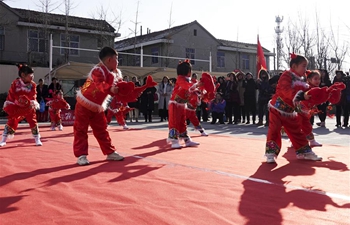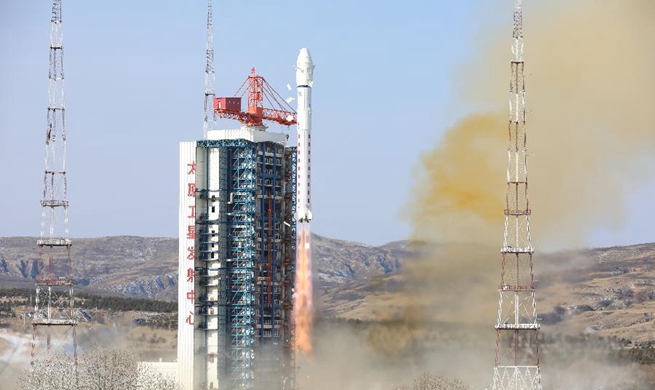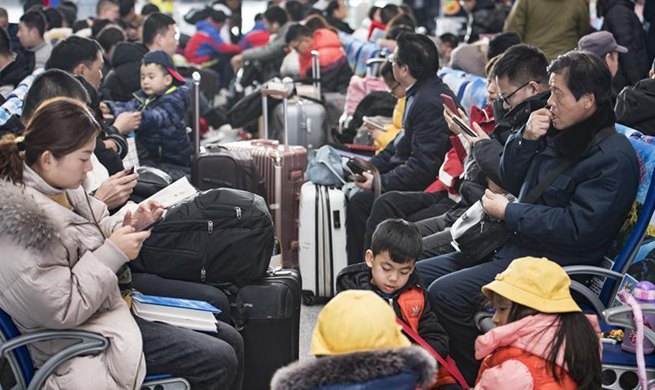by Nick Kolyohin
JERUSALEM, Jan. 15 (Xinhua) -- Representatives of emergency organizations from 35 countries gathered from Sunday until Wednesday for the sixth international conference IPRED on emergency, preparedness, and response in Israeli coastal city of Tel Aviv.
Over 1,000 delegates participated in the convention and massive field exercise, which took place at the Israeli army base next to the Gaza strip.
The event comes on the heels of increased global risks in both geopolitical tensions and natural disasters in which countries are ensuring that they are best prepared to respond to mass casualty events, according to the statement of the organizers.
Humanitarian needs in 2019 were unprecedented and predicted to be the same in 2020, according to a keynote speaker at the conference Ursula Mueller, an assistant secretary-general for humanitarian affairs and deputy emergency relief coordinator in the UN office for the coordination of humanitarian affairs (OCHA).
There are two types of emergencies that dominate most of the attention of the humanitarian system. The first is disasters related to natural hazards.
"Last year globally, 315 disaster events caused by natural hazards were recorded, which led to an estimated 11,800 deaths, affected 68.5 million people and clocked up over 131 billion U.S. dollars worth of damage", Mueller stressed during her speech on stage.
The second type of emergencies, said Mueller, is complex emergencies with layers of underlying issues, political sensitivities, historical conflict, inter-communal violence, and so on.
Those events are challenging to operate and to access the people in need. "We have seen an alarming increase in attacks against health workers and health facilities in complex crises all over the world," said Mueller.
"At the first nine months of 2019, there were 825 attacks recorded against health workers and health care facilities, resulting in 171 deaths," she added.
According to Mueller, it is a significant increase from 2018, where there were 131 aid workers killed and 130 kidnapped.
The participants of the event called for more international cooperation to facilitate better global and local disasters, where borders usually don't stop the crises.
Dr. Luigi Migliorini, World Health Organization's special representative to Israel, said in an interview with Xinhua that sometimes countries are in chaos during disasters and they need international help to facilitate the aid.
Mario Raviolo, senior director of Italian Regione PIemonte field hospital, told Xinhua that it makes much more sense to join forces globally and work together to get better results and save money by collaboration.
In 2019, member states of the UN and others gave 60 billion U.S. dollars in response to United Nations coordinated appeals to provide 103 million people with life-saving assistance, stated Mueller.
A total of 75 percent of funding for humanitarian response worldwide is now coordinated through the UN, but needs are growing faster than the funding.
"There are two main reasons," said Mueller. Firstly, conflicts are becoming more protracted and intense. Combatants display a growing disregard for international humanitarian law.
People caught up in conflict suffered displacement, hunger, psychosocial trauma, and loss of their livelihoods, schools, and health services.
The second cause is climate change, more frequent drought and extreme weather events, such as flooding and tropical cyclones, disproportionately affect the already poor and vulnerable people.
Noa Hasdai, director of the Israeli National Health Emergency Operation Center, Ministry of Health, said in an interview with Xinhua that Israeli military has a first-class field hospital that renowned around the world and would like to give humanitarian assistance whenever it needs.
In the first half of 2019, disasters caused by natural hazards caused seven million people to be displaced, most of them in Africa and Asia.
Close to four million people, mostly in Africa and the Middle East, were forced out of their homes because of conflict and violence.
In 2020, the UN expects that high record in decades of 168 million people globally would be in need of humanitarian assistance and protection.
More than 200 million people around the globe would need humanitarian assistance by 2022, according to UN projections.

















